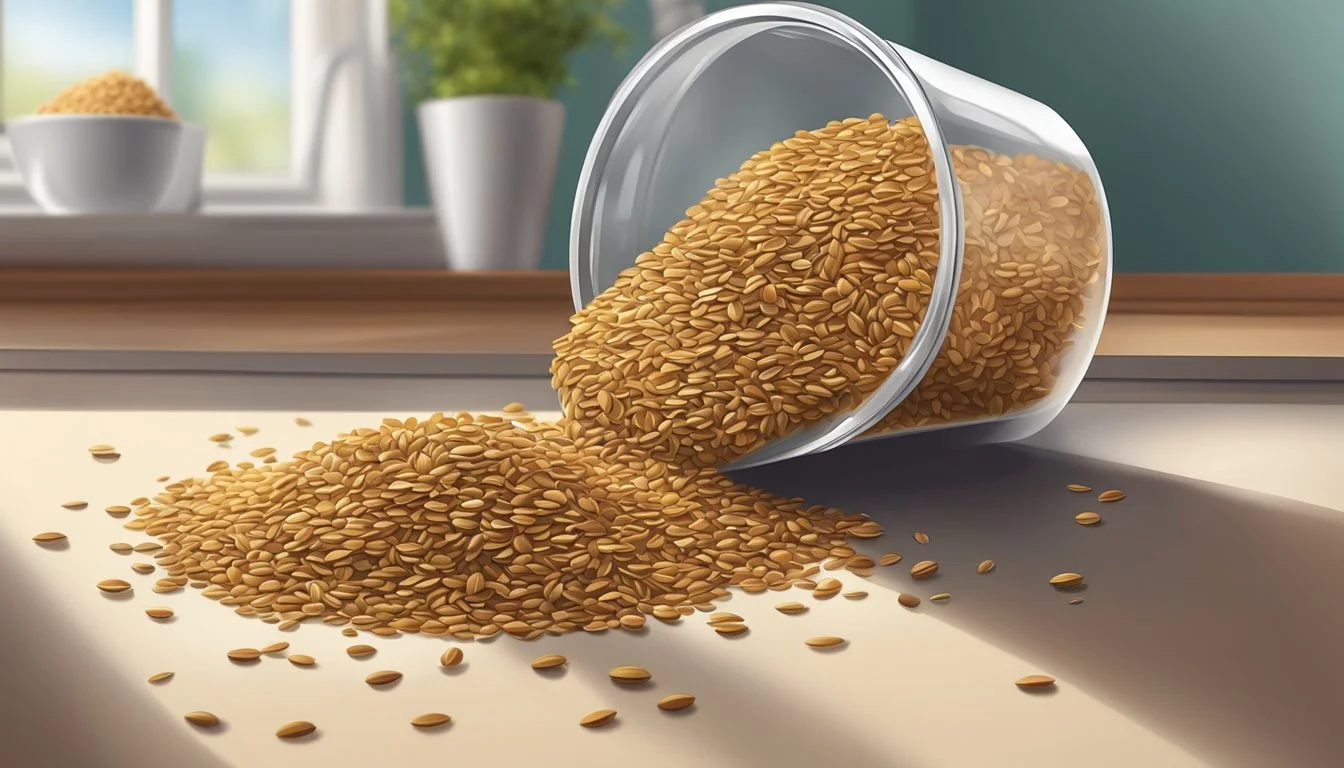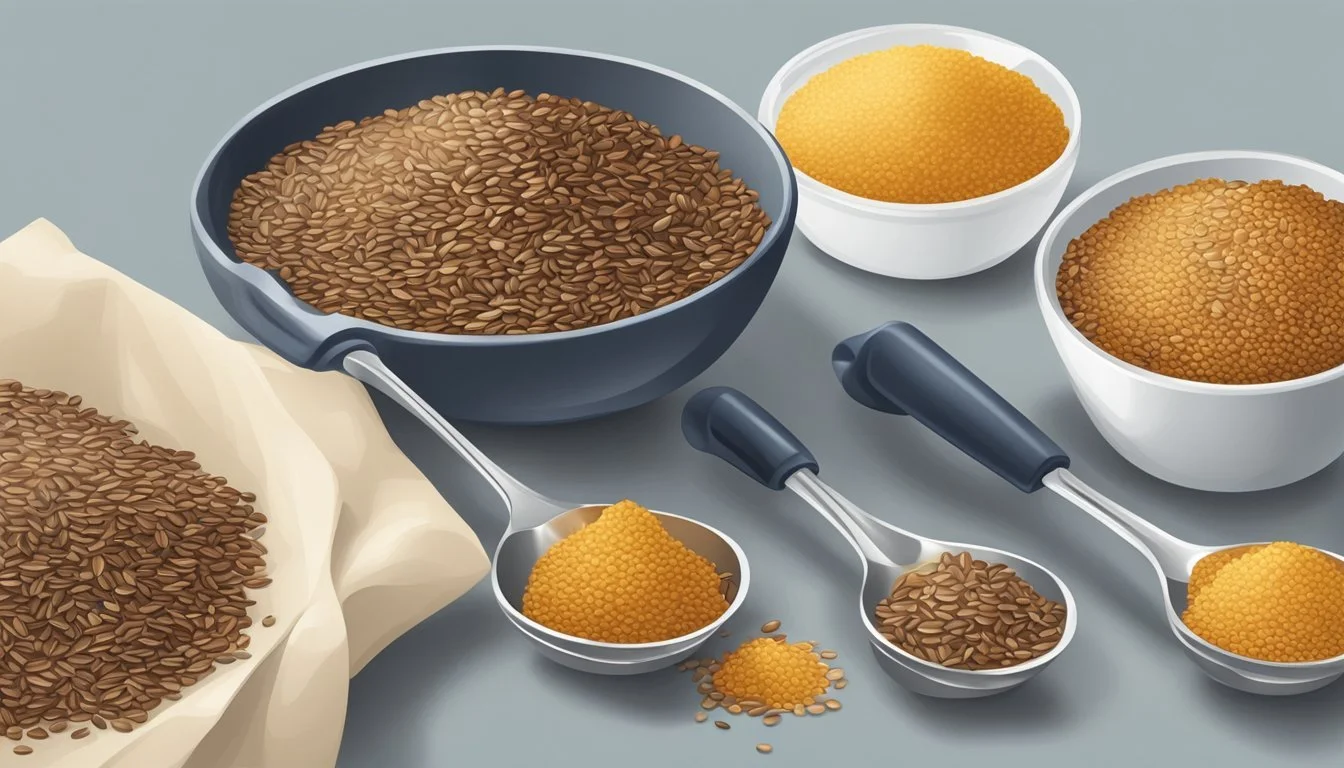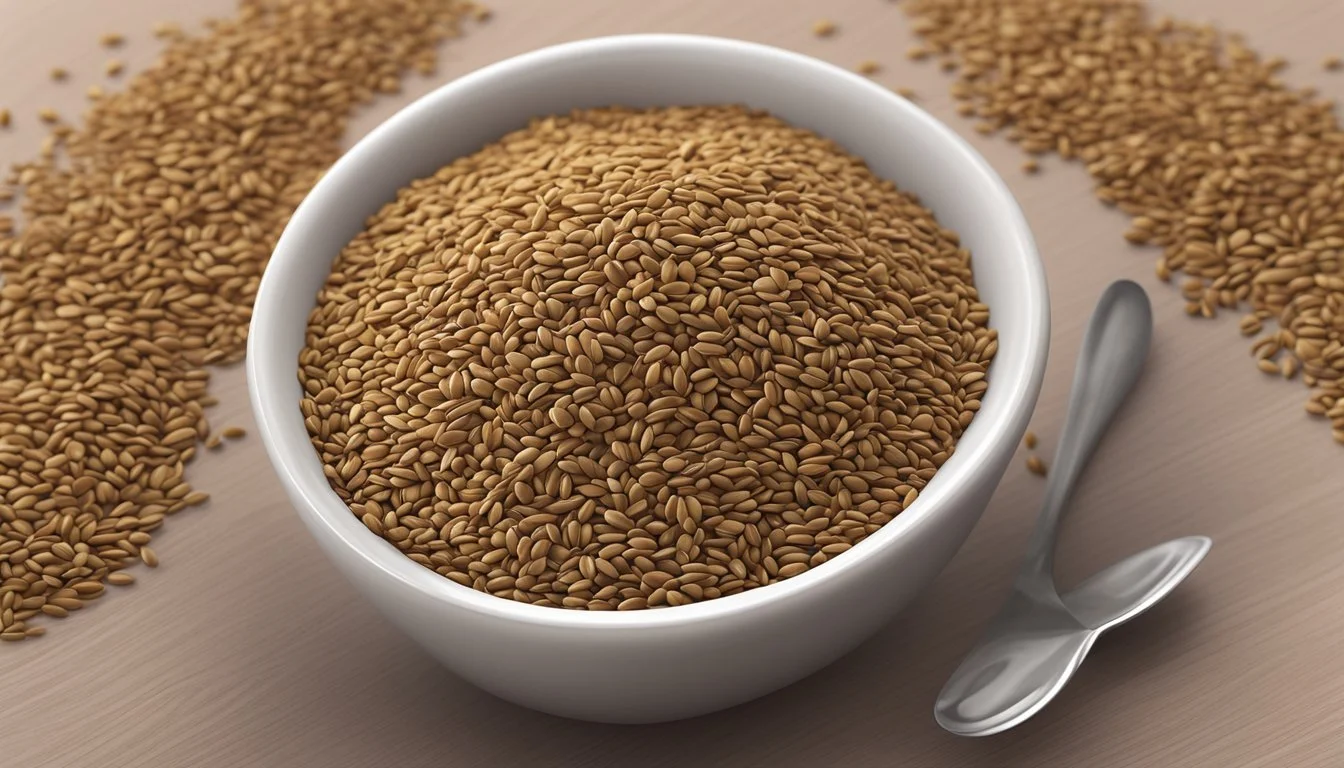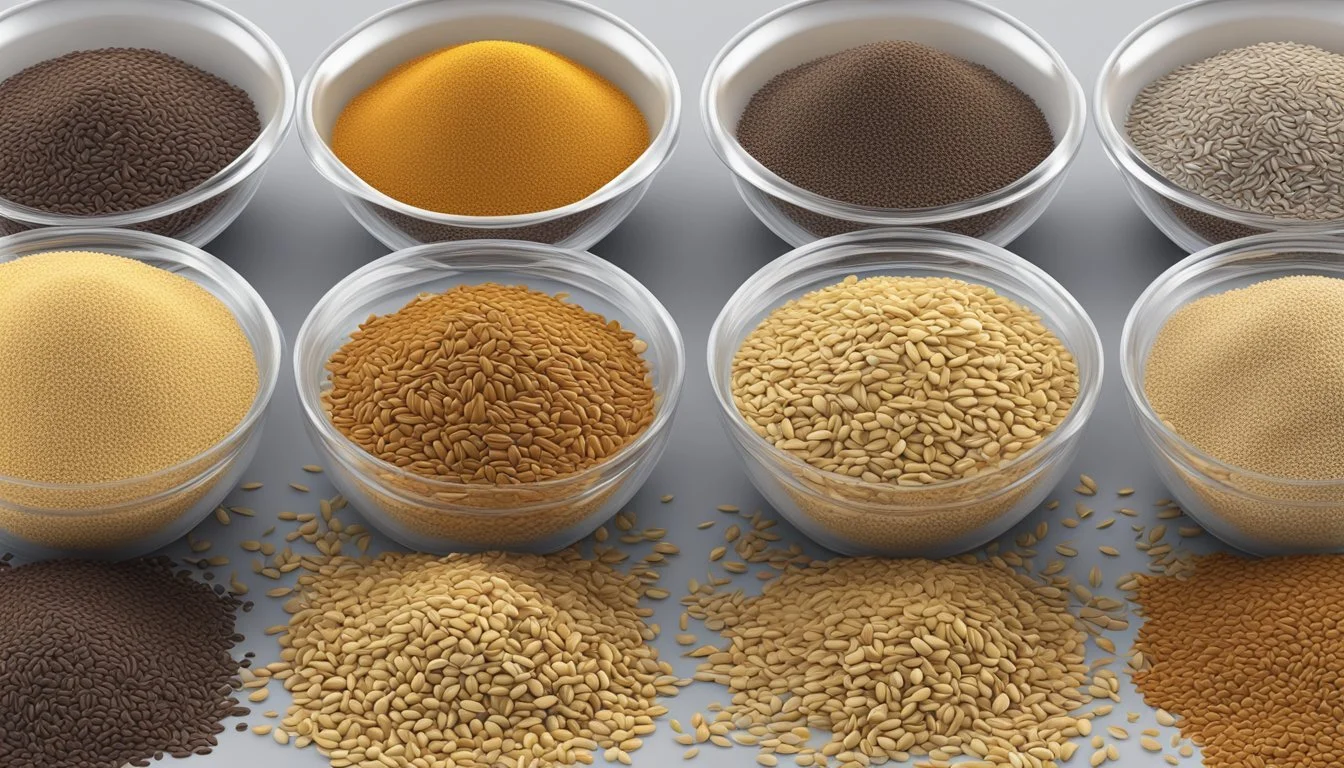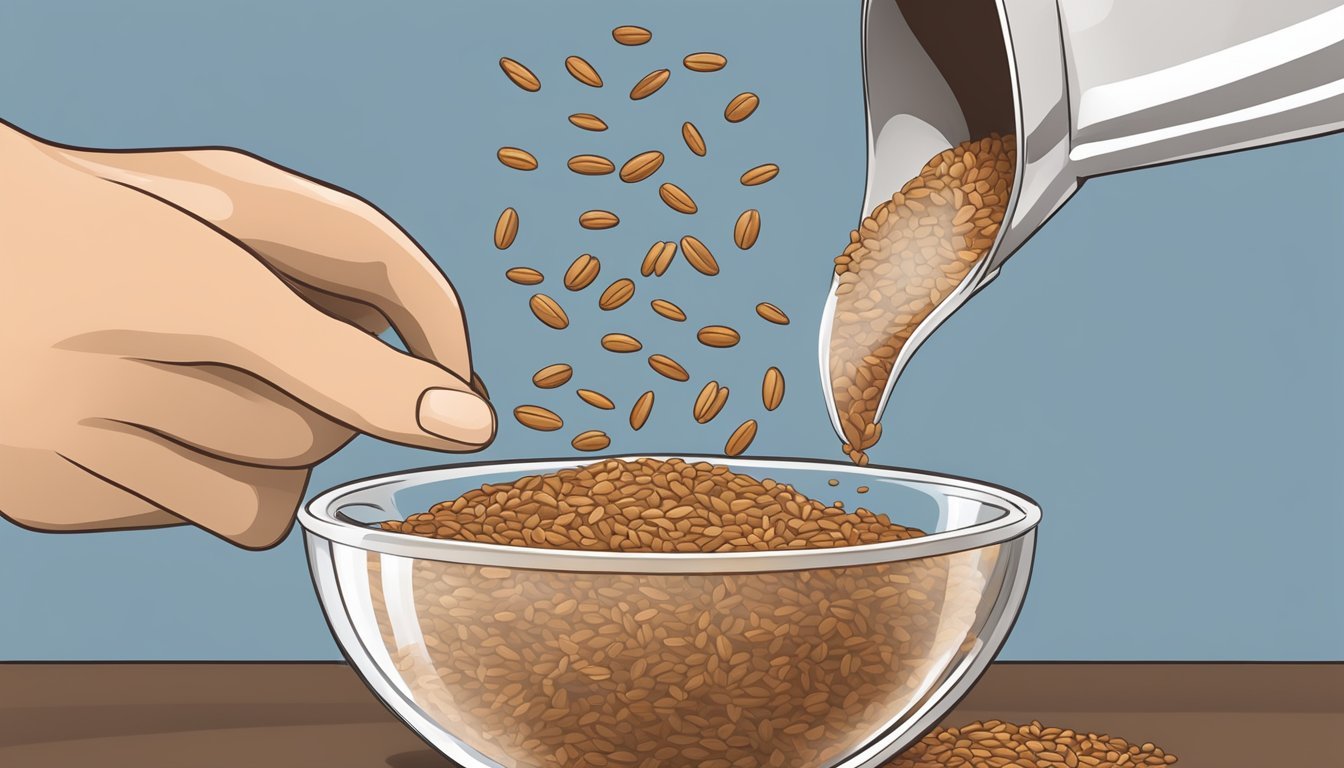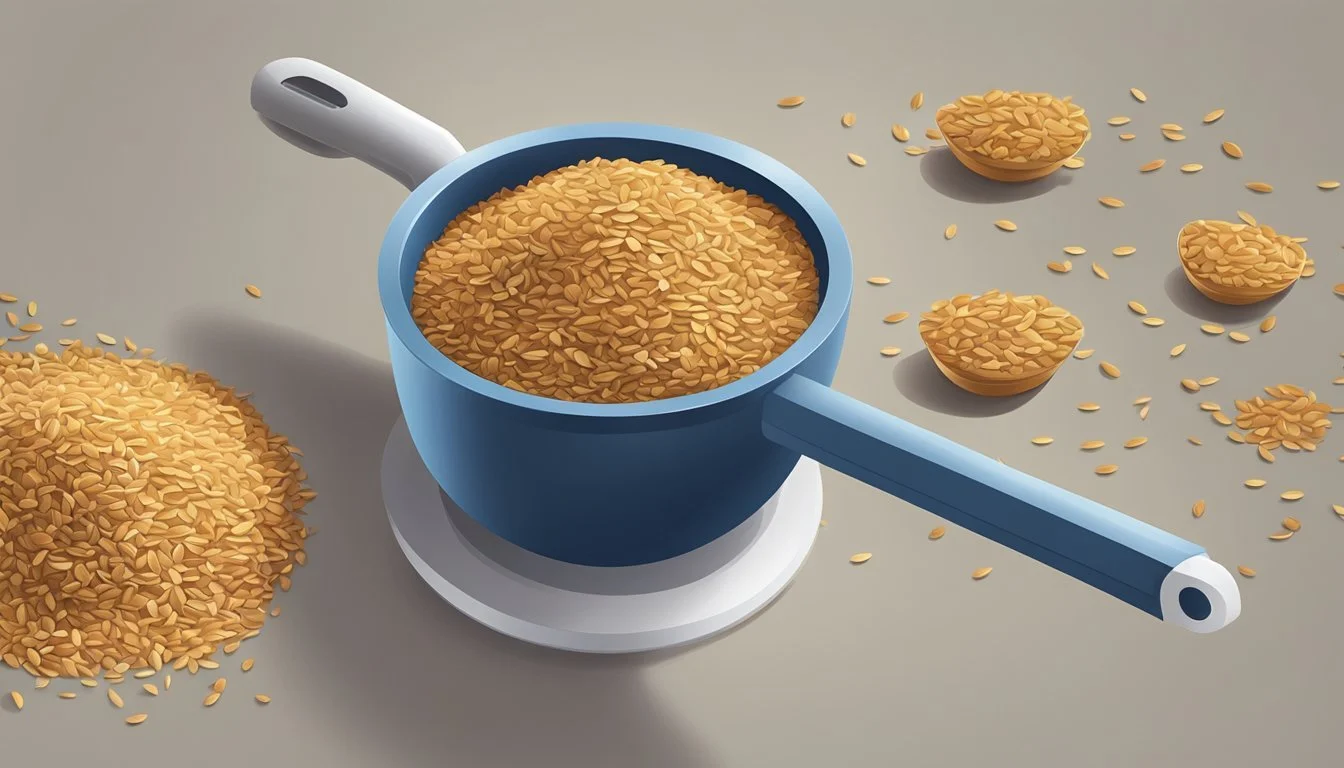How Many Cups in a Pound of Flaxseed
The Definitive Guide
When working with flaxseeds in the kitchen or formulating a recipe, it's often necessary to convert weights to volumes for accuracy and ease of preparation. Flaxseeds, like many other dry ingredients, have a specific volume-to-weight ratio which is crucial for making such conversions. Understanding this ratio is essential for chefs, bakers, and home cooks alike to ensure that their recipes turn out perfectly each time.
One pound of whole flaxseeds is equivalent to approximately 3.04 US cups. This conversion is based on the average density of whole flaxseeds. However, due to factors such as settling and differences in measuring methods, the actual volume may slightly vary. It's important to note that this measurement applies to whole flaxseeds rather than ground, as ground flaxseeds may have a different volume-to-weight ratio.
Understanding Measurements in the Kitchen
In the kitchen, precision can significantly impact the outcome of a recipe. Mastering the conversion between weight and volume is essential for accuracy in culinary preparations.
Weight vs Volume
When it comes to kitchen measurements, weight and volume are two distinct concepts that often lead to confusion. Weight, measured in grams and pounds, refers to the heaviness of an ingredient. For instance, one pound is equivalent to 453.592 grams. On the other hand, volume measures the space an ingredient occupies, commonly quantified in teaspoons, tablespoons, US cups, liters, and milliliters. It's important to understand these differences because a cup of one substance does not weigh the same as a cup of another due to varying densities.
Common Measurement Conversions
Navigating between various units of measure in the kitchen requires familiarity with some standard equivalencies:
Weights:
1 ounce = 28.3495 grams
1 pound = 16 ounces = 453.592 grams
Volumes:
1 US cup = 8 fluid ounces = 16 tablespoons = 48 teaspoons
1 liter = 1000 milliliters = 4.22675 US cups
1 tablespoon = 3 teaspoons
These conversion ratios serve as a foundation for translating recipes or adjusting ingredient quantities with the understanding that specific ingredient densities can alter these general rules.
Specifics of Flaxseeds
Flaxseeds, often known as linseed, come in variations and are measured by weight and volume. The conversion between these units is integral for culinary and nutritional applications.
Types of Flaxseed
Flaxseeds exist primarily in two types: brown and golden. Both types share similar nutritional profiles and can be used interchangeably in recipes. They are available as whole seeds or ground into a meal.
Weight to Volume Conversion for Flaxseed
When converting weight to volume for flaxseeds, the following approximations are useful:
1 pound of whole flaxseeds is roughly equivalent to 3 US cups.
178 grams (g) fill 1 metric cup, or approximately 6.3 ounces (oz).
In smaller measurements, 0.1 pound of flaxseeds converts to 0.304 US cup.
Here is a table for a quick reference to common conversions:
Flaxseed Weight Volume in US Cups 0.1 pound 0.304 US cup 0.3 pound 0.913 US cup 0.4 pound 1.217 US cup 1 pound 3 US cups
Average Weight of Flaxseed
Flaxseeds are relatively light with an average weight:
1 US cup of flaxseeds weighs 5.9 oz.
1 tablespoon of whole flaxseeds, which is a common serving size, has a weight of approximately 10 grams.
It is important to note that weight can vary slightly depending on factors such as moisture content and whether the seeds are whole or ground.
Nutritional Profile of Flaxseed
Flaxseed is recognized for its high content of healthy fats, especially omega-3 fatty acids, and its rich nutritional composition that includes both macronutrients and micronutrients. This section provides a detailed look at what these tiny seeds have to offer.
Macronutrients
Calories: Flaxseeds contain about 534 calories per 100 grams.
Carbohydrate: They consist of approximately 29% carbohydrates.
Protein: Flaxseeds offer 18% protein, contributing to muscle repair and growth.
Fat: A high proportion of fat content in flaxseeds is healthy fat, constituting around 42%, which includes a significant amount of polyunsaturated fat.
Fiber: Rich in dietary fiber, with a noteworthy content of 7.7 grams per ounce, flaxseed aids in digestion and promotes satiety.
Vitamins and Minerals
Vitamins: They are a source of B-vitamins such as thiamin, niacin, vitamin B6, and folate.
Minerals: The seeds provide essential minerals including:
Mineral Percentage of Daily Value Manganese 13% Magnesium 10% Phosphorus 7% Copper 6% Selenium 4%
These vitamins and minerals are crucial for various bodily functions, such as energy production and immune defense.
Health Benefits of Flaxseed
Flaxseed's composition is linked to various health benefits. It is well-known for:
Heart Health: The omega-3 fatty acids help in maintaining healthy blood pressure levels and reducing LDL cholesterol, diminishing the risk of cardiovascular diseases.
Digestive Health: High fiber content assists in preventing constipation.
Anti-inflammatory Properties: Omega-3s and lignans found in flaxseed have anti-inflammatory effects, beneficial for overall health.
Culinary Uses of Flaxseed
Flaxseeds, also known as linseed, are a versatile ingredient used in various culinary applications. They offer an array of health benefits and can be incorporated into recipes either as a primary ingredient or as a substitute for other common ingredients.
Flaxseed as an Ingredient
When used directly in recipes, flaxseeds contribute a nutty flavor and can be incorporated in both whole and ground form. Here are specific ways to use them:
Baking: Ground flaxseeds can be added to breads, muffins, and pancakes for added nutrition.
Breakfast: They can be sprinkled over oatmeal or mixed into smoothies.
Salads: Whole flaxseeds add a crunchy texture to salads.
Meat Substitutes: They can also be used as a binding agent in vegetarian/vegan patties or meatballs.
Ingredient Measurements for Flaxseed:
Whole Flaxseeds: 1 pound of whole flaxseeds is roughly equivalent to 3 to 4 cups.
Ground Flaxseeds: 1 pound will yield approximately 4 cups of milled flaxseeds.
Substitute for Flaxseed
Flaxseeds can be used as a substitute for various ingredients, particularly for vegan diets or for those with certain food allergies. They are primarily used as a replacement for eggs and can also serve as an alternative to fats like butter or oil in some recipes.
Egg Replacement: Known as a "flax egg," combining 1 tablespoon of ground flaxseed with 3 tablespoons of warm water is equivalent to one egg. This works well in recipes where eggs act as a binding agent such as pancakes, cookies, and muffins.
Fat Replacement: Flaxseeds can be used as a fat substitute by using flax meal. The ratio is generally 3:1 for oil, meaning 3 tablespoons of flax meal for every tablespoon of oil required in the recipe.
When using flaxseed as a substitute, it's important to consider the ratios and understand how it may alter the texture of the final dish. For example, when substituting flaxseeds for walnuts or other nuts, it is important to keep in mind that flaxseeds have a different texture and will absorb moisture differently than nuts would. Similarly, while chia seeds can sometimes be used interchangeably with flaxseeds as a binding agent in baking, they also have their own distinct properties and may result in a slightly different texture and flavor profile.
Flaxseed in Different Diets
Flaxseed, whether whole, ground, or as golden flaxseed, is a valuable ingredient catering to various dietary needs. It provides essential omega-3 fatty acids and serves as a versatile component in gluten-free baking, vegetarian and vegan diets, as well as keto and low-carb plans.
Gluten-Free Baking
In gluten-free baking, flaxseed is revered for its binding properties that can closely mimic the gluten found in wheat. When ground flax is mixed with water, it forms a gelatinous consistency similar to an egg. This can be particularly helpful in recipes for bread or muffins, where golden flaxseed often adds a mild, nutty flavor and helps maintain structure.
Recipe Tip: Combine 1 tablespoon of ground flax with 3 tablespoons of water to replace one egg.
Vegetarian and Vegan Diets
Flaxseed's high omega-3 content makes it a staple in vegetarian and vegan diets. Since plant-based eaters may not consume fish, a primary source of these fatty acids, flaxseed offers a plant-based omega-3 alternative. Additionally, the seeds are a good source of protein and essential minerals.
Nutrition Spotlight: Each tablespoon of flax seeds provides approximately 1.8 grams of plant-based omega-3s.
Keto and Low-Carb Diets
For those on keto and low-carb diets, flaxseed is a desirable option due to its high fiber and low net carbohydrate content. Ground flax can be used in a variety of recipes, from “noatmeal” to low-carb bread, aiding in satiety and digestion without spiking blood sugar levels.
Keto-Friendly: 2 tablespoons of ground flaxseed contain about 0g of net carbs.
Table: Nutritional Composition of Flaxseed (per tablespoon)
Nutrient Amount Calories ~55 Protein 1.8g Fat 4.3g Fiber 2.8g Omega-3s 1.8g
By incorporating flaxseed into these various diets, individuals can enjoy its health benefits and versatility in meal preparation.
Buying and Storing Flaxseed
When incorporating flax seeds into a diet, understanding the correct measurement conversions and proper storage techniques are essential for maintaining their nutritional value and freshness.
Selection
When purchasing whole flax seeds, buyers should opt for products in opaque packaging to protect the seeds from light, which can degrade their quality. The typical conversion from weight to volume is crucial for recipe precision: 1 pound of whole flax seeds equates to approximately 2.75 to 3 US cups. Selection should not only be based on quantity but also on the appearance, favoring seeds that look glossy and are free from moisture, indicating freshness.
Storage Tips
Storage of flaxseed, both whole and ground, significantly impacts their shelf life and freshness:
Whole Flax Seeds:
Store in the original container, or transfer to a mason jar or airtight container.
Can be kept at room temperature or refrigerated.
Shelf life ranges from one to two years if stored correctly.
Ground Flaxseed (flaxseed meal):
Should be stored in an airtight container.
Refrigerate to extend freshness, ideally used within a few months.
Best consumed within a week once opened.
It's key to store flaxseed away from heat and light and consider refrigeration for any unused portions to preserve the oils and nutrients within the seeds.
Preparing Flaxseed for Cooking and Baking
When incorporating flaxseed into recipes, one can choose to use it either whole or ground, with the latter providing better nutrient absorption. Precise measurements ensure the desired consistency and taste of the final dish.
Grinding Flaxseed
One can easily grind whole flax seeds using a coffee grinder, blender, or food processor to unlock their nutritional benefits. Ground flaxseed is more easily digested and its nutrients are better absorbed by the body compared to whole flax seeds. A serving size of ground flax is typically 2 tablespoons, which provides an ample amount of Omega-3 fatty acids.
Measuring Flaxseed
For accuracy when adding flaxseed to recipes, one should use the following conversions:
1 tablespoon of whole flax seeds = approximately 1.75 teaspoons of ground flax.
To convert to US cups, consider that about 48 tablespoons of ground flax equals around 1 US cup.
It is important to note that flax seeds absorb water, and recipes may require an adjustment in liquid amounts to maintain the right consistency. When used as an egg substitute, known as 'flax egg', one combines 1 tablespoon of ground flax with 3 tablespoons of water, allowing it to sit and thicken before use.
FAQs About Flaxseed Measurement
When cooking or baking with flaxseeds, precise measurements are crucial. The following frequently asked questions aim to help one understand how to convert the weight of flaxseeds into volume measurements like cups, tablespoons, and teaspoons.
Q: How many US cups are there in a pound of whole flaxseeds? A: One pound of whole flaxseeds is equivalent to approximately 2.5 to 3 US cups.
Q: What is the conversion of flaxseeds from cups to ounces? A: One US cup of flaxseeds typically weighs around 5.9 ounces.
Q: How do I measure a serving size of flaxseeds in tablespoons or teaspoons? A: A serving size can vary, but generally, one serving of flaxseeds is around 2 tablespoons, equivalent to 6 teaspoons.
The conversions are approximate and can depend on the flaxseed's density and how it's packed into the measurement tool. Below is a simplified reference table:
Weight US Cups Tablespoons Teaspoons 1 pound 2.5 - 3 32 - 48 96 - 144 1 ounce ~1/3 cup 2 6 1 tablespoon N/A 1 3 1 teaspoon N/A 1/3 1
Remember, these measures pertain to whole flaxseeds. Ground flaxseeds occupy less volume for the same weight, so one would need fewer cups or spoons for the equivalent weight in pounds or ounces. It's always advised to use specifically designed kitchen scales for most accurate results.

